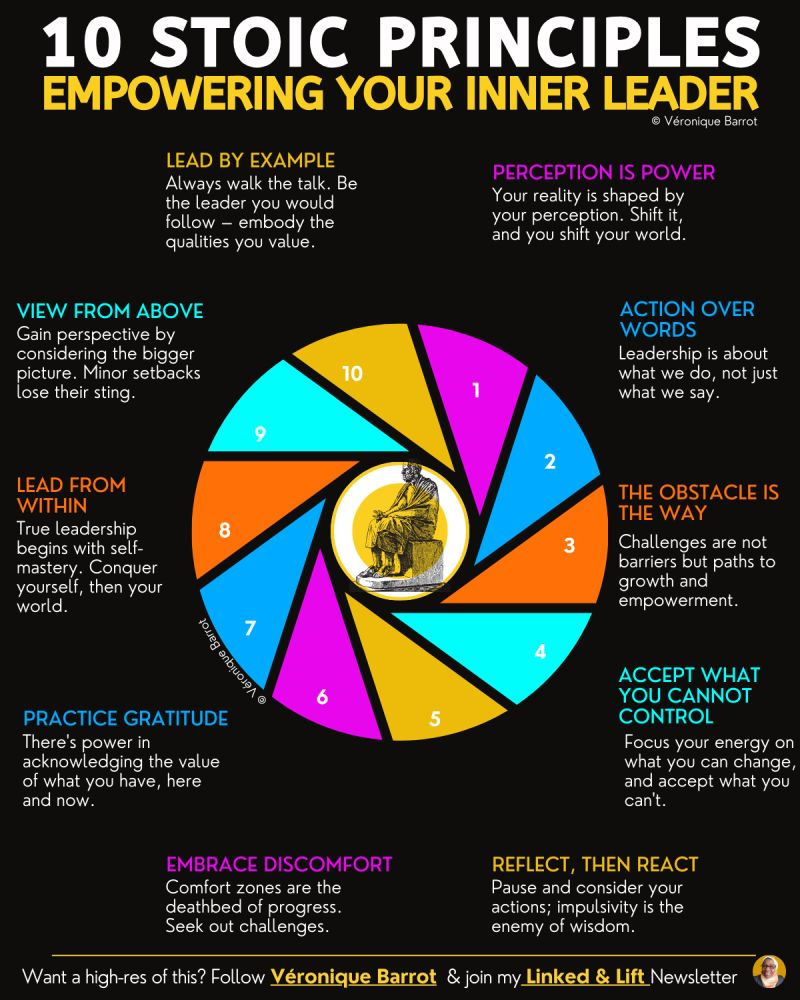Introduction
I never expected to find myself at a Stoic meetup on a chilly Tuesday evening last month. As I walked into the cozy coffee shop, I was stunned to see over 50 people crammed into the space, all eager to discuss how ancient philosophy could help them navigate the chaos of modern life. It was a vivid illustration of the surging interest in Stoicism I'd been hearing about.
This growing fascination with Stoic principles isn't just anecdotal. Recent studies show a 34% increase in interest among young professionals since 2020. It seems we're collectively searching for practical wisdom to help us stay grounded in our fast-paced, often overwhelming world.
As someone who's been exploring Stoicism for a few years now, I've seen firsthand how its timeless insights can transform daily life. From managing stress at work to navigating complex relationships, Stoic practices offer a framework for living with greater purpose and resilience.
In this guide, we'll dive deep into the foundations of Stoicism, explore its modern applications, and discover how to integrate its wisdom into our digital-age lives. Whether you're a curious newcomer or a seasoned practitioner, I hope you'll find something valuable to take away from our journey through this ancient yet remarkably relevant philosophy.
Key Takeaways
- Stoicism offers practical tools for navigating modern challenges
- The four cardinal virtues (wisdom, justice, courage, temperance) provide a framework for ethical living
- Stoic practices can improve mental health, decision-making, and resilience
- Applying Stoic principles to digital life can reduce stress and increase focus
- Stoicism has applications in environmental ethics, leadership, and business
The Foundations of Stoicism
When I first stumbled upon Stoicism, I'll admit I had some misconceptions. I thought it was all about suppressing emotions and enduring hardship with a stiff upper lip. Boy, was I wrong. As I dug deeper, I discovered a rich philosophy that's far more nuanced and practical than I'd imagined.
At its core, Stoicism isn't about becoming an unfeeling robot. It's about developing inner strength, making ethical choices, and finding a sense of peace amidst life's inevitable ups and downs. The ancient Stoics emphasized living in harmony with nature and reason – ideas that still resonate powerfully today.
One of the things that struck me most as I explored Stoic teachings was their focus on what's within our control. It's a simple idea, but it's been transformative in my own life. Instead of stressing about things I can't change, I've learned to focus my energy on my own thoughts, actions, and reactions. It's not always easy, but it's incredibly empowering.
Origins and Evolution
The journey of Stoicism from ancient Greek porticos to modern boardrooms is a testament to its enduring wisdom. This philosophy, born from adversity, has evolved over centuries to address the human condition in various contexts.
Zeno of Citium: The Founder's Journey
I love the origin story of Stoicism because it's such a perfect example of turning adversity into opportunity. Zeno, a merchant from Cyprus, lost everything in a shipwreck near Athens around 300 BCE. Talk about a bad day at the office. But instead of giving up, he found himself drawn to philosophy, eventually founding the school of thought we now know as Stoicism.
Zeno's teachings emphasized living in harmony with nature and reason, ideas that still resonate today. His approach to life's challenges – focusing on what's within our control – forms the bedrock of Stoic practice. It's a principle I've found incredibly useful in my own life, especially when dealing with setbacks or unexpected obstacles.
Roman Stoicism: Seneca, Epictetus, and Marcus Aurelius
As Stoicism spread, it found fertile ground in the Roman Empire. Three figures in particular – Seneca, Epictetus, and Marcus Aurelius – took Zeno's ideas and made them practical for everyday life.
Seneca, a wealthy advisor to Emperor Nero, showed how Stoicism could be applied in positions of power. His letters and essays are full of practical advice on everything from dealing with anger to managing wealth ethically. I've often turned to Seneca's writings when grappling with work-related stress or ethical dilemmas.
Epictetus, on the other hand, was born a slave. His life story demonstrates that Stoic principles were accessible to all, regardless of social status. His teachings, recorded by his student Arrian, focus on personal freedom and the power of our own perceptions. Epictetus' reminder that it's not events themselves that disturb us, but our judgments about them, has been a game-changer for me in managing anxiety and stress.
Finally, we have Marcus Aurelius, the philosopher-emperor. His personal journal, known to us as "Meditations," offers a glimpse into how Stoicism can help navigate the pressures of leadership and public life. I find myself returning to Marcus' writings often, especially when I'm feeling overwhelmed by responsibilities or struggling to maintain perspective.
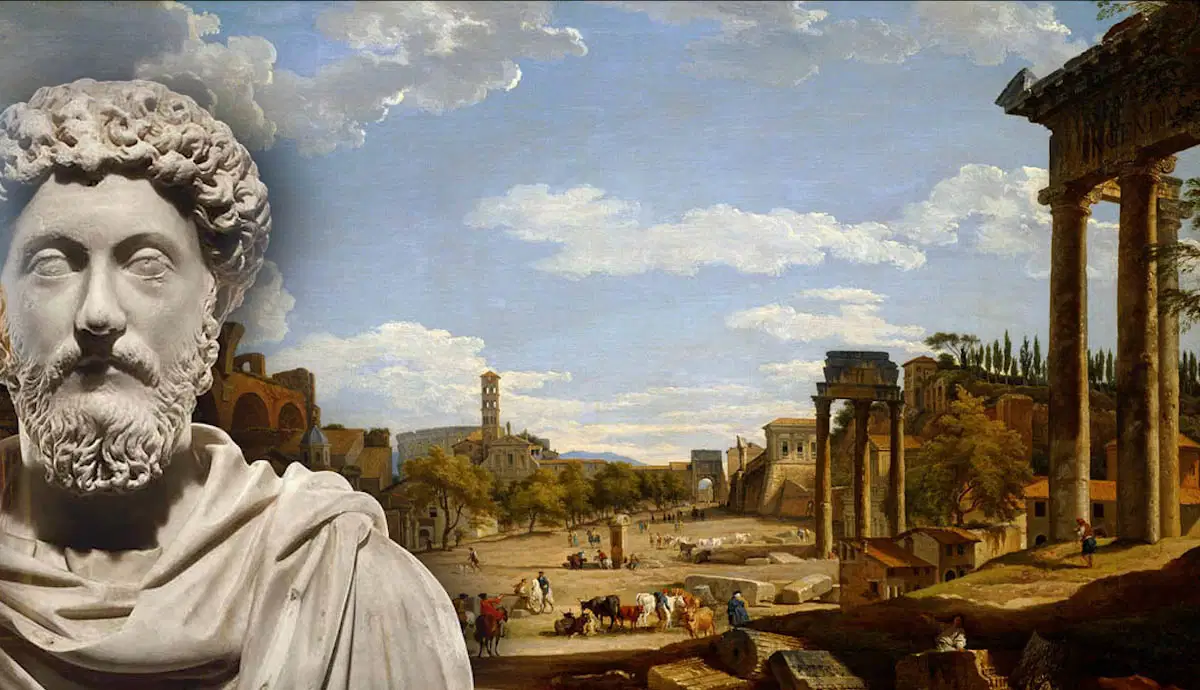
The Four Cardinal Virtues
At the heart of Stoic philosophy lie four cardinal virtues: wisdom, justice, courage, and temperance. These aren't just lofty ideals; they're practical guides for daily decision-making and behavior.
The Stoic emphasis on these virtues reflects a core aspect of Stoic thought – the belief that cultivating virtue is the path to a good life. By understanding and embodying these virtues, we can cultivate a more balanced, ethical, and resilient approach to life's challenges.
Wisdom (Sophia)
In Stoicism, wisdom isn't about knowing everything; it's about practical knowledge – knowing how to act rightly in any given situation. It involves clear judgment, the ability to see things as they are without emotional distortion.
Cultivating wisdom means continually learning, questioning our assumptions, and striving to understand the world around us more deeply. It's about making informed decisions based on reason and experience, rather than acting on impulse or emotion.
In my own life, I've found that pursuing wisdom often means admitting when I don't know something and being open to changing my mind. It's not always comfortable, but it's led to better decisions and a deeper understanding of myself and others.
Justice (Dikaiosyne)
Justice in Stoic philosophy goes beyond legal definitions. It's about fairness, integrity, and doing what's right, not just what's easy or beneficial to oneself. This virtue guides us in our interactions with others, encouraging us to treat everyone with respect and dignity.
Practicing justice might mean standing up for someone who's being treated unfairly, even when it's inconvenient or risky. It could also involve acknowledging our own biases and working to overcome them. In my experience, striving for justice often requires courage and can be challenging, but it's essential for building a society we want to live in.
Courage (Andreia)
Stoic courage isn't about fearlessness; it's about facing fears and challenges head-on. It's the strength to do what's right, even when it's difficult or unpopular. This virtue helps us confront life's obstacles with resilience and determination.
I've found that courage often shows up in small, everyday moments. It might be speaking up in a meeting when you disagree with the majority, or having a difficult conversation with a friend. It's about pushing through discomfort for the sake of growth or doing what's right.
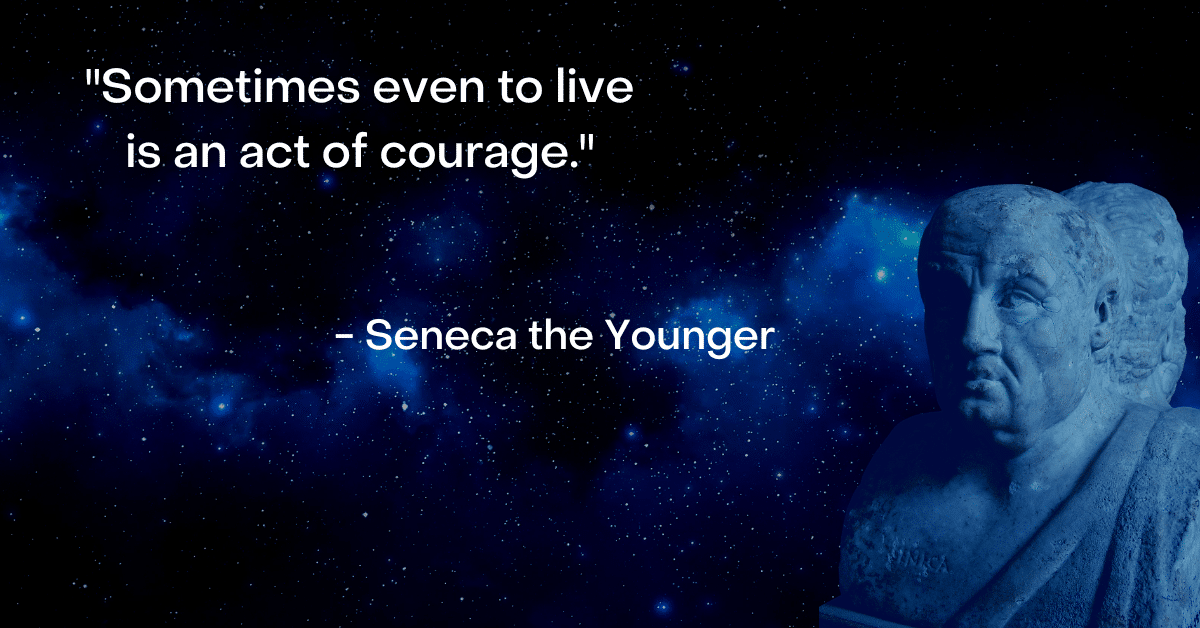
Temperance (Sophrosyne)
Temperance is often misunderstood as mere abstinence, but in Stoicism, it's about moderation and self-control in all aspects of life. It's the ability to balance our desires and impulses with reason and ethics.
Practicing temperance might mean setting healthy boundaries with work, moderating our use of social media, or being mindful of our consumption habits. It's about finding the sweet spot between indulgence and deprivation, always guided by reason and our values.
In my own journey with Stoicism, I've found that these four virtues often work together, reinforcing each other. Wisdom helps us understand what's truly important, justice guides our actions towards others, courage gives us the strength to act on our principles, and temperance helps us maintain balance and self-control.
Stoic Practices for Modern Living
One of the things I love most about Stoicism is that it's not just a set of ideas to ponder – it's a practical philosophy meant to be lived. In our fast-paced, often chaotic modern world, Stoic practices offer a way to find calm, clarity, and purpose.
The ancient Stoics developed various exercises and techniques to cultivate virtue and resilience in daily life. What's remarkable is how relevant and applicable these practices remain today. Whether you're dealing with work stress, relationship challenges, or the constant barrage of information in our digital age, Stoic practices can help you navigate with greater ease and wisdom.
I've been incorporating these practices into my own life for several years now, and the impact has been profound. From managing anxiety to making difficult decisions, Stoic techniques have provided me with valuable tools for personal growth and resilience.
Let's explore some key Stoic practices and how we can apply them in our modern context:
Mindfulness and Self-Reflection
In a world of constant distractions, Stoic mindfulness practices help us stay grounded and self-aware. These techniques allow us to pause, reflect, and make conscious choices rather than reacting on autopilot.
The Evening Review
The Evening Review is a powerful Stoic practice for self-improvement. At the end of each day, take a few minutes to reflect on your actions, decisions, and interactions. Ask yourself:
- What did I do well today?
- Where did I fall short of my principles or goals?
- How can I improve tomorrow?
This practice has been a game-changer for me. It helps me celebrate small victories, learn from mistakes, and set intentions for the next day. Over time, I've noticed patterns in my behavior and made meaningful changes as a result.

Negative Visualization (Premeditatio Malorum)
Negative visualization might sound pessimistic, but it's actually a tool for cultivating gratitude and resilience. The practice involves briefly imagining losing something or someone you value – your job, your health, a loved one – and then returning to the present moment with a renewed appreciation for what you have.
I was skeptical of this practice at first, but I've found it incredibly powerful. It helps me avoid taking things for granted and prepares me mentally for potential challenges. Plus, it's a great antidote to the "hedonic treadmill" – our tendency to quickly adapt to positive changes and always want more.
Emotional Regulation
Stoicism offers powerful tools for managing our emotional responses to life's ups and downs. These techniques aren't about suppressing emotions, but about understanding them and responding thoughtfully rather than reacting impulsively.
The Dichotomy of Control
The Dichotomy of Control is a fundamental concept in Stoic philosophy that can significantly reduce stress and anxiety. It involves categorizing everything in our lives into two buckets:
- Things we can control (our thoughts, actions, and reactions)
- Things we can't control (external events, other people's opinions, etc.)
The Stoics advise us to focus our energy on what we can control and accept what we can't. This doesn't mean being passive about external events, but rather understanding the limits of our influence and choosing our battles wisely.
I've found this principle incredibly liberating. When I catch myself stressing about things outside my control – like traffic or the weather – I remind myself to refocus on what I can influence. It's amazing how much mental energy this frees up.
Check out this stoicism explainer video.
Rational Analysis of Impressions
This Stoic practice involves pausing to examine your initial reactions to situations before acting on them. When faced with a challenging event or emotion, ask yourself:
- What is the objective situation? (Separating facts from interpretations)
- What is my initial impression or judgment about it?
- Is this impression accurate and helpful?
- How can I reframe this in a more balanced or constructive way?
I've found this practice particularly helpful in managing anxiety and anger. By taking a step back and examining my thoughts, I often realize that my initial reaction is based on assumptions or fears rather than reality. This creates space for a more measured and effective response.
Ethical Decision-Making
Stoicism provides a framework for navigating complex moral dilemmas in our personal and professional lives. By grounding our decisions in virtue and reason, we can act with greater integrity and purpose.
The View From Above
The View From Above is a mental exercise that helps put your problems into perspective. Imagine yourself rising above your current situation, seeing your city from above, then your country, the planet, and finally the vastness of the cosmos. From this cosmic perspective, consider:
- How significant is your current problem in the grand scheme of things?
- What really matters in life?
- How would you act if you were viewing your situation from this broader perspective?
This practice never fails to shift my perspective when I'm feeling overwhelmed or caught up in trivial concerns. It reminds me of what truly matters and helps me approach challenges with a calmer, more balanced mindset.

Role Ethics
Role ethics in Stoicism involves reflecting on the various roles you play in life – perhaps as a parent, a professional, a friend, or a citizen – and considering how to fulfill these roles virtuously. Ask yourself:
- What roles do I play in life?
- What does excellence look like in each of these roles?
- How can I embody virtue (wisdom, justice, courage, temperance) in fulfilling these roles?
This practice has helped me navigate complex ethical dilemmas by providing a framework for decision-making. When faced with a difficult choice, I consider my various roles and how I can best fulfill them with integrity.
Stoicism in the Digital Age
As we navigate the complexities of the digital world, Stoic principles offer valuable guidance. The constant connectivity and information overload of our modern era present unique challenges that the ancient Stoics couldn't have imagined. Yet, their teachings on self-control, mindfulness, and focusing on what truly matters are more relevant than ever.
I've personally struggled with finding balance in my digital life. The allure of endless scrolling, the pressure to always be available, and the fear of missing out (FOMO) have all taken their toll at times. But by applying Stoic principles, I've found ways to use technology more intentionally and maintain my mental well-being in the digital age.
Digital Minimalism
Digital minimalism, inspired by Stoic principles, is about intentionally curating your digital life. It's not about rejecting technology altogether, but rather being selective about what tools and platforms you use and how you use them.
The concept of digital minimalism resonates deeply with Stoic ideals of focusing on what's essential and avoiding unnecessary distractions. In practice, this might mean:
- Regularly auditing your apps and digital subscriptions
- Setting specific times for checking email and social media
- Creating tech-free zones or periods in your day
I've found that implementing these strategies has not only reduced my screen time but also increased my focus and overall sense of well-being. It's remarkable how much mental clarity you can gain by simply reducing digital clutter.
Attention Management
In our hyper-connected world, managing your attention is crucial. The Stoics emphasized the importance of directing our focus towards what truly matters, and this principle is more relevant than ever in our age of endless notifications and information streams.
Implementing these strategies has been a game-changer for me. I've reclaimed hours of my day and found myself more engaged in my work and relationships.
Virtual Virtue
Practicing Stoic ethics in online interactions is increasingly important as more of our lives move into digital spaces. The anonymity and distance of online communication can sometimes lead to behavior we wouldn't engage in face-to-face. Applying Stoic principles to our digital interactions means:
- Treating others with respect, even in disagreements
- Being mindful of the impact of our words and actions
- Cultivating empathy and understanding in online discussions
I've noticed that approaching online interactions with these principles in mind leads to more meaningful conversations and helps maintain my own peace of mind, even in heated discussions.
Stoic Approaches to Information Overload
The sheer volume of information available today can be overwhelming. Stoicism offers principles that can help us navigate this abundance without becoming stressed or losing focus on what's truly important.
Selective Consumption
Applying Stoic wisdom to media consumption means prioritizing quality over quantity. This involves:
- Carefully choosing your information sources
- Setting limits on news consumption
- Focusing on timeless content rather than ephemeral trends
I've found that being more selective about what I read and watch has not only saved time but also improved the quality of my thoughts and conversations.

Digital Detox Practices
Regular periods of disconnection are essential for maintaining mental clarity and inner tranquility. Some Stoic-inspired digital detox practices include:
- Weekly tech-free days or evenings
- Digital fasts during vacations or retreats
- Mindful tech use, focusing on one task at a time
These practices have helped me reconnect with myself and the physical world around me, often leading to new insights and increased creativity.
The Future of Stoicism
As we look ahead, Stoicism continues to evolve and find new applications in contemporary life. Its enduring principles are being adapted to address modern challenges in mental health, environmental ethics, and business leadership.
Stoicism and Mental Health
The intersection of Stoic philosophy and modern psychology is a growing area of interest. Many mental health professionals are recognizing the value of Stoic practices in treating conditions like anxiety and depression.
Cognitive Behavioral Therapy and Stoicism
The parallels between Stoic exercises and Cognitive Behavioral Therapy (CBT) techniques are striking. Both emphasize the role of our thoughts in shaping our emotions and behaviors. CBT practitioners are increasingly incorporating Stoic principles into their work, recognizing their effectiveness in helping patients reframe negative thought patterns.
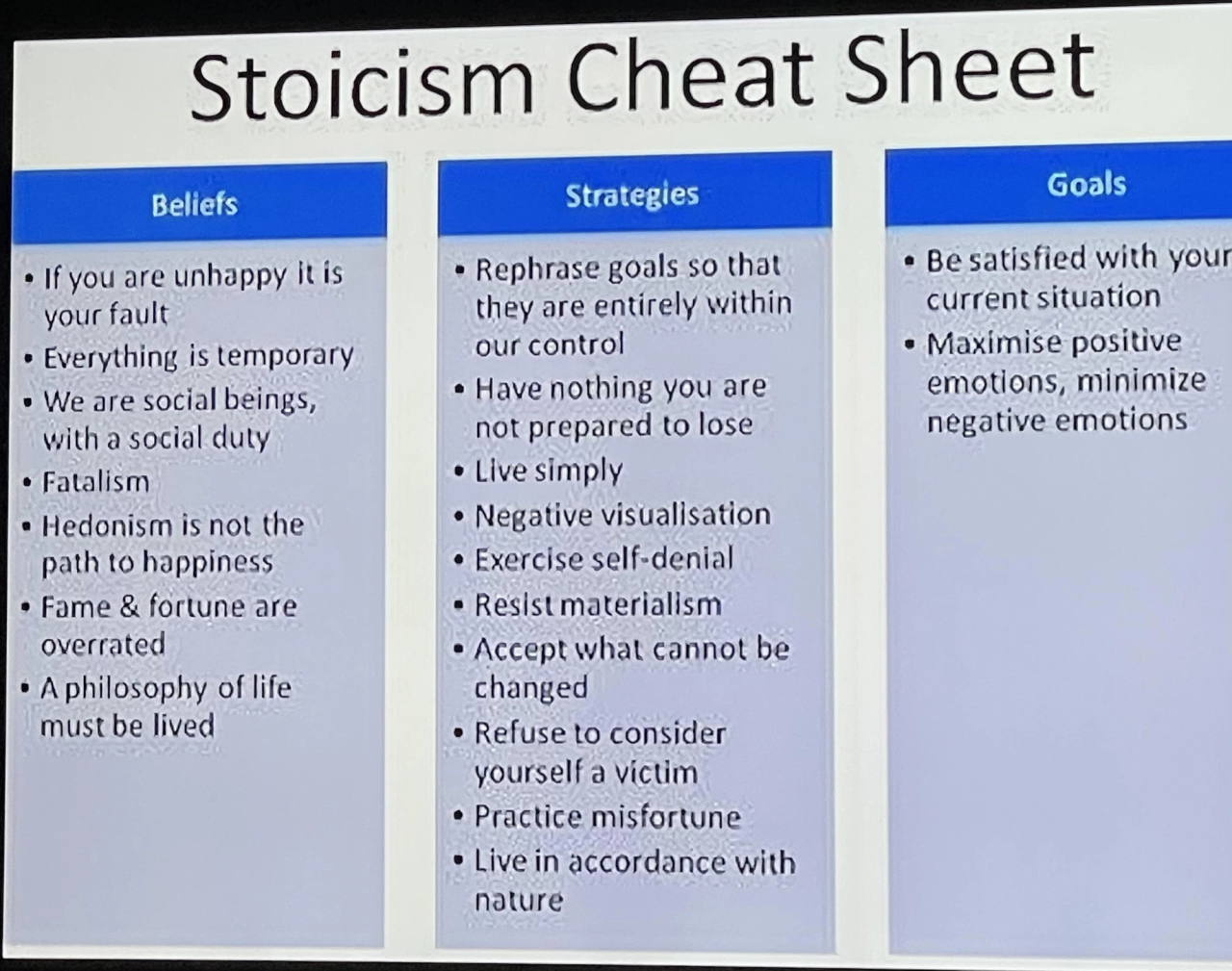
Stoic Mindfulness in Stress Management
Stoic principles offer powerful tools for coping with anxiety and depression in our modern world. Practices like negative visualization and the dichotomy of control can help individuals develop resilience and a more balanced perspective on life's challenges.
Environmental Stoicism
As environmental concerns become increasingly urgent, Stoic ethics offer a framework for approaching these challenges. The Stoic emphasis on living in harmony with nature and focusing on what we can control provides a valuable perspective on environmental action.
Stoic Environmentalism
Stoic environmentalism applies the concept of living in accordance with nature to ecological stewardship. This approach encourages individuals to take responsibility for their environmental impact while accepting the limits of their individual influence.
Sustainable Living Through Stoic Virtues
The Stoic virtues provide a guide for making sustainable lifestyle choices. For example:
- Wisdom: Making informed decisions about consumption and resource use
- Justice: Considering the global impact of our actions
- Courage: Standing up for environmental causes, even when it's difficult
- Temperance: Practicing moderation in consumption and waste
Applying these virtues to environmental issues has helped me make more conscious choices in my daily life, from reducing plastic use to supporting sustainable businesses.
Stoicism in Leadership and Business
Stoic principles are increasingly recognized for their potential to enhance leadership skills and foster ethical business practices. In an era of rapid change and uncertainty, Stoic wisdom offers a steady foundation for decision-making and organizational culture.
Stoic Management Techniques
Incorporating Stoic principles into management can transform team dynamics and organizational culture. Some key applications include:
- Focusing on what can be controlled in uncertain business environments
- Practicing empathy and ethical decision-making
- Cultivating resilience in the face of setbacks
I've seen firsthand how these principles can create more positive and productive work environments, leading to better outcomes for both employees and the organization as a whole.
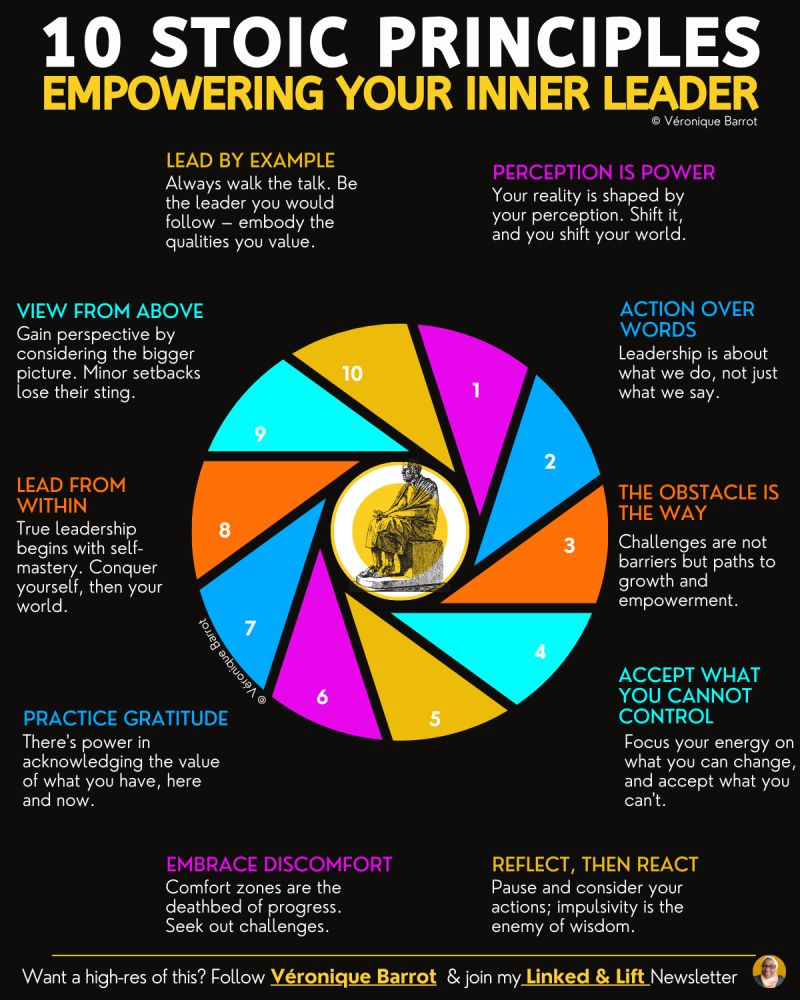
Ethical Entrepreneurship
Stoic virtues provide a solid foundation for responsible business decision-making. By prioritizing long-term value creation over short-term gains and considering the broader impact of business decisions, entrepreneurs can build more sustainable and socially responsible enterprises.
Learnings Recap
As we wrap up our exploration of Stoicism in 2024, it's clear that this ancient philosophy offers timeless wisdom for navigating modern challenges. Here are the key takeaways:
- Embrace the four cardinal virtues - wisdom, justice, courage, and temperance - as guiding principles in all aspects of life.
- Practice mindfulness and self-reflection through techniques like the Evening Review and Negative Visualization.
- Apply the Dichotomy of Control to reduce stress and focus your energy on what you can influence.
- Use Stoic principles to navigate the digital landscape mindfully, managing your attention and practicing virtual virtue.
- Integrate Stoic practices with modern psychological approaches for improved mental health and resilience.
- Apply Stoic ethics to environmental challenges, fostering a more sustainable and responsible lifestyle.
- Implement Stoic wisdom in leadership and business to create more ethical and effective organizations.
Remember that Stoicism is a practical philosophy - its true value lies in daily application and continuous practice.
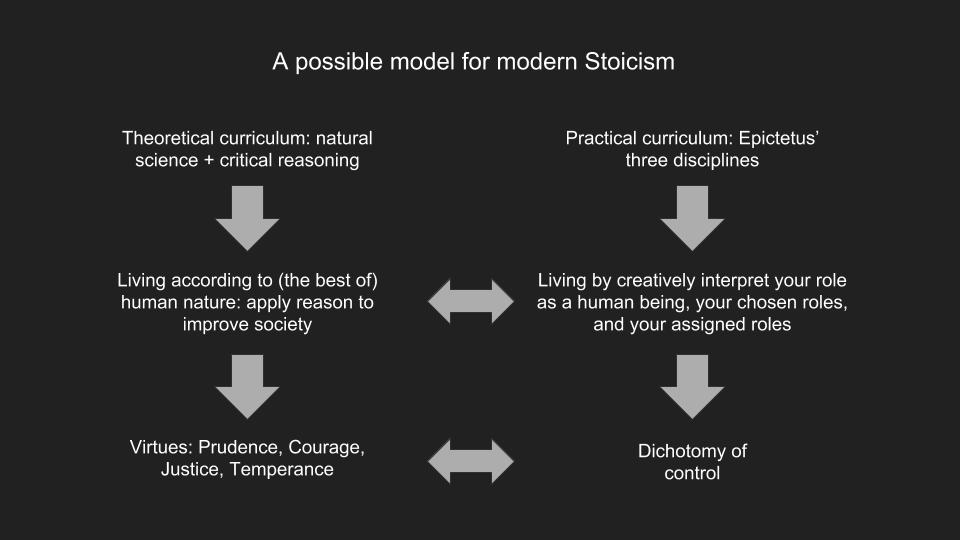
For more insights on applying Stoic principles in daily life, check out our guide on how to stay grounded and move forward. This article provides practical tips for maintaining a Stoic mindset in challenging times.
To explore how Stoic principles can help in professional settings, read our article on how to not be afraid of your boss. It offers Stoic-inspired strategies for managing workplace relationships and stress.
For a deeper dive into Stoic practices for emotional regulation, visit our post on how to be the captain of your soul. This article explores Stoic techniques for maintaining emotional balance and personal autonomy.
Get our next quote reflection straight to your inbox 👇
Share with a fellow Stoic 🙏
